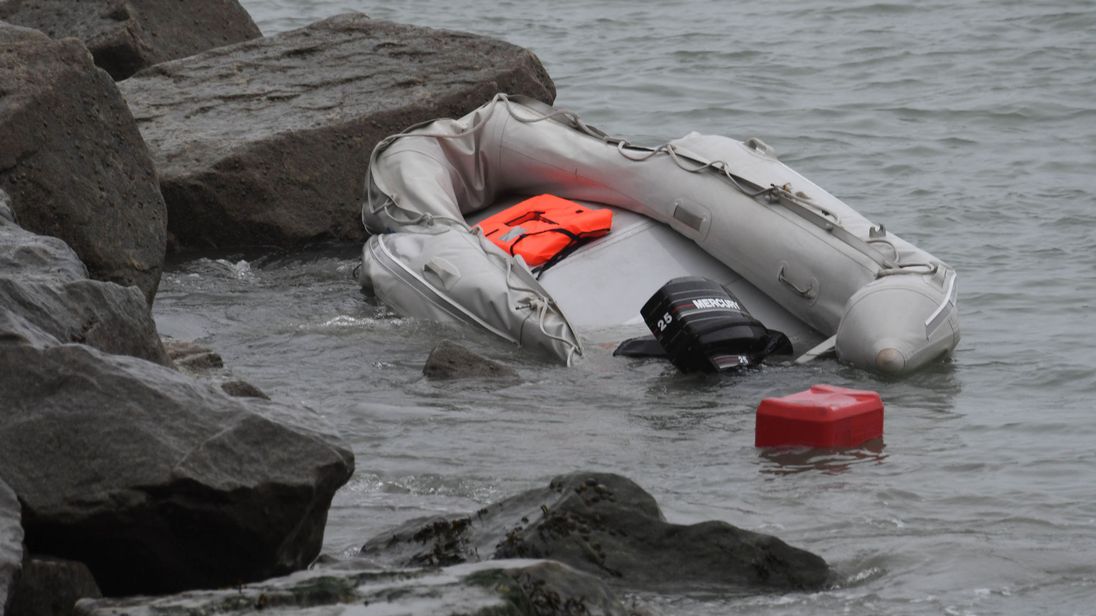December 21, 2018
President Trump may be agitated over an invasion of the United States by Central Americans, but Britain now appears to be undergoing a similar, if smaller, invasion by Iranians.

In early November, police in the northern French village of Wissant made the first of a series of unusual discoveries in the sand dunes: an inflatable boat intended to ferry migrants in the dead of night to Britain.
From the beach in Wissant, the cliffs of the British coastline can be seen on the horizon. “The Channel looks narrow, but it’s still 30 kilometers (19 miles),” says Wissant Mayor Bernard Bracq.
His picturesque village, a 20-minute drive from the port of Calais, has become one of the launching posts for asylum seekers trying to reach Britain by boat.
In the last half of November, French authorities have detected 28 attempts by migrants, mostly Iranians, to cross. That’s two attempts per day.
That figure is more than double the number of attempts for the whole of last year, leaving border police scrambling to understand why.
The usual method for traveling illegally to Britain has been stowing away in one of the thousands of trucks ferried daily across the English Channel.
But in Wissant alone, at least three inflatable dinghies hidden in the dunes have been found in recent weeks by police, who have stepped up their surveillance along the coast.
The migrants “are looking for a Plan B,” Bracq says. “It’s a bad Plan B, though, because it’s extremely dangerous.”
Another 20 minutes west lies the fishing port of Boulogne-sur-Mer, where a brazen theft three weeks ago brought the sudden change in tactics to public attention.
Local fisherman Pascal Deborgher was awakened at home at 1:00 am on November 13 by the coastguard informing him that his boat was doing strange maneuvers on a route used by ferries near the English coast.
A few hours earlier, a group of Iranians had stolen his 12-meter (40-foot) fishing boat from its dock and sailed it erratically in the darkness across the English Channel. British authorities intercepted the 17 people on board, including three children.
“We’ve learned from the investigation that one of them knew a bit about fishing, and had sailed boats before,” Deborgher told Agence France Presse (AFP).
Explanations for the sudden spurt in sea crossings vary.
The weather during November was unusually calm, coastguard and security officials said—although the winter chill has nonetheless left many migrants attempting the crossing with hypothermia.
Others have suggested that Britain’s impending exit from the European Union next March could be playing a role, prompting fears among migrants that Britain will clamp down even more on immigration post-Brexit.
But Christian Salome, who heads the Auberge des Migrants, a local French charity that has fed and clothed thousands of people, scoffs at that idea. “Migrants are not following European politics,” he says.
Fabien Sudry, the top security official in the northern Pas-de-Calais region, is also skeptical.
He thinks the most likely reason is the arrival over the last month of a larger-than-usual number of Iranians in the Calais area. They generally have more money than African migrants. They have attracted, or led to the creation of, a new people-smuggling network that is trying to avoid increasingly tough truck security controls around the port of Calais. “We are much more effective in detecting clandestine passengers,” Sudry says, pointing to new scanning technology, among other measures.
This in turn has created greater desperation among the young men in Calais who cluster, hunched in the cold, under bridges or in tents on muddy wasteland near the port.
An estimated 600 people from Africa, South Asia and Iran are in Calais, the main gateway for trade in goods between France and Britain. The numbers are much lower than at their height, when nearly 10,000 lived in a notorious camp known as the Jungle, which was torn down in late 2016.
“I know people who have made 20 to 30 attempts,” an Iranian who gave his name as Mehdi told AFP, as he stood in clouds of campfire smoke at one semi-tolerated camp of tents.
Smugglers prey on such misery, visiting at night, offering supposedly safe passage in trucks with hidden compartments for 4,000-8,000 euros ($4,500-$9,000) per person.
The cliffs of England may be tantalizingly close, but, as Mehdi put it, “It’s really, really difficult” to reach them.